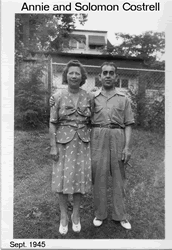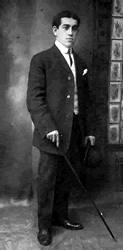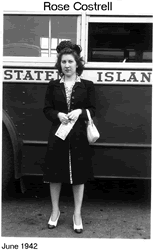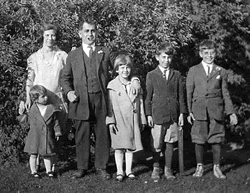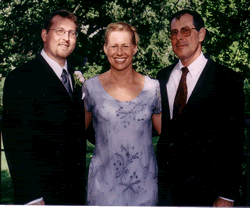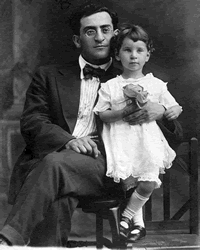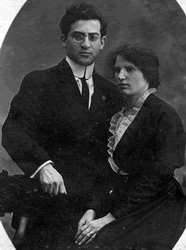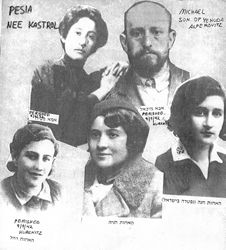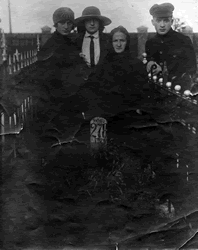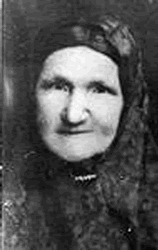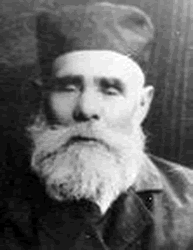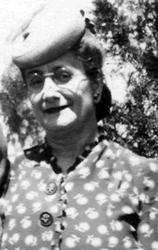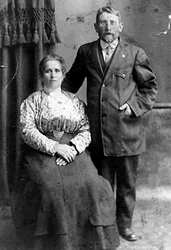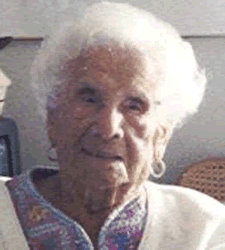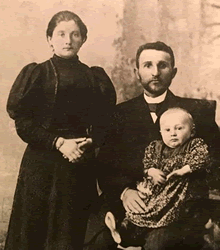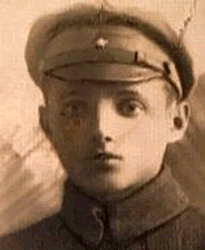#cstrl-1: Annie nee
Alperovitz/ Cohen (her family originated in Sosenka) and
Solomon Costrell
( son of Nachum Castrel, the Shochet of Kurenets c 1900)
Pictures are courtesy of Russel Byer (a great grandchild of Annie and
Solomon)
and Annie Costrell)
#cstrl-6
Hyman Costrell,
the brother of Solomon ( both sons of Nachum Castrol, Hashochet of
Kurenets) . Hyman was the communist party member. His wife is
Bessie Alpert (daughter of Zalman Alpert/ Alperovitz) I sent you that
photo already I
believe. His daughter is Dorothy.
#cstrl-7
Hyman Costrell,
the brother of Solomon ( both sons of Nachum Castrol, Hashochet of
Kurenets) . Hyman was the communist party member. His wife is
Bessie Alpert (daughter of Zalman Alpert/ Alperovitz) I sent you that
photo already I
believe. His daughter is Dorothy.
#cstrl-8
Pesia nee Costrell/ Kastrel- the daughter of nachum and sister of
Solomon and hyman. She perished with 3 of her 6 children in Kurenets/
Vileyka in 1942.
#cstrl-9
The marker ; "Shmuel Levin"
this photo was an unknown in the group I received from a descendant of
Hyman Costrell.
#cstrl-10
Miriam (Mariasha) Castroll nee Alperovitz was the wife of Velvel.
Her Birth Date: 1854 Death Date: 15 Sep 1930 Age at Death: 76 Burial
Plot: T 33 Burial Place: Orange, Connecticut, United States Father
Name: Jacob Cemetery: Beth Israel Cemetery Address: 833 Derby Avenue
Cemetery Burials: 496
#cstrl-11
Velvel (son of Yisrael Hirsh nee Castroll and Itka Alpeovitz of
Kurenets) had 8 children: Avrom stayed in Russia, Nathan, Zelech,
Gershon (Chicago), Gertrude, Ezra, Schmuel David m. Bessie (daughter was Sarah Castroll Levine (Messina, NY) whose daughter is my cousin and friend Marsha Levine Rothschild of Syracuse, NY. & Benjamin.
Benjamin had 4 children; Edward (son is Michael Castroll) , Anna, Ida, Harry.
#cstrl-12
Gertrude Deitch, daughter of Jacob Kasden and Rhoda nee Costrell.
#cstrl-13
Jacob Kasden and wife Rhoda Kasden. She was born in 1860 in
Kurenets to Yisroel Hirsch Castroll and Itka Castroll nee Alperovitz.
Death: January 1938 (78)
Derby, CT, USA Place of Burial: Beth Israel Cemetery Address: 833
Derby Avenue Cemetery Burials: 496, Connecticut.
#cstrl-14
Rose Katz, daughter of Jacob Kasden and Rhoda nee Costrell.
#cstrl-15:
Zelig and Chaia Rachel Castrol
#cstrl-16:
Aba Castrol
Solomon Costrell was born in
Kurenets. He was the brother of Pesia (aka
Pashka),
the wife of Michael Alperovitz. The son of Pashka and Michael
Alperovitz ( Nachum Alperovitz, Named for his grandfather; Nachum
Kastrel) wrote a book. You could read it on line;
Thus It Began
Chapters from the Underground
by Nachum Alperovich
http://www.jewishgen.org/yizkor/kurenets/kur321.html
Here are some passages from the book "....I was drawn to HaShomer
Hatzair from a very early age, following my older sisters' example. My
oldest sister, Hannah, was one of the first youths in our town to join
the movement. Later, my sisters Henia and Rachel joined the movement
too. Hannah spent many seasons in training camps. She yearned to
become a chalutza and was waiting for years for a permit to leave for
Eretz Israel. Her dream was finally realized in 1938, still without a
permit. Using fake papers, she reached Israel on a boat of illegal
immigrants. I was the only son—we were one boy and five
girls. Our
mother was very brave and clever. In 1917, she was very committed to
the Russian revolution. Although she was married at the time and had
two young daughters, she deeply believed in and fought for communism.
Eventually, she lost some of her zeal for communism.
At our house, my mother's brothers
(Castroll) were often mentioned.
Two of her brothers left for America before I was born; one of them
had a candy store. His financial situation was not great and I
remember that in one of his letters he wrote, "I have a sweet business
with a sour income." My mother's other brother in America was Chanan
Castroll. He was the secretary of the Communist Party in New York. In
1938, he was a member of a committee that went to Moscow, and people
said that he even met Stalin! Hence it must have been a familial
trait, this interest in political action.
Father, on the other hand,
was very different—quiet and much more
cautious. Perhaps his somber encounters in youth made him cautious.
When he was very young, he immigrated to the United States, but was
not satisfied with the way of life in the U.S. After a short time, he
returned to the town.
Mother was very involved with
the youth movement, and sometimes I felt
that if she were younger, she would have chosen the path of the youth
movement. From this, you can probably gather that I never needed to
rebel against my parents, even though outwardly it seemed that their
lifestyle was similar to that of the rest of the town's Jews. Half of
our house, which stood in the market center, was for our personal use
and the second half was a fabric store.
My education was the typical
education in the shtetl. First I went to
a cheder, and later to Tarbut school, where we spoke only Hebrew;
there I finished four grades. There was no fifth grade, so the next
year we had to continue our studies in a Polish public school. When
the school year started I was tested, but I failed the test.
Considering that I barely knew
Polish, this was not a surprise.
Instead of putting me in fifth grade, they wanted to put me in third
grade. The teacher and headmaster in the school was a Polish man named
Mataras. Mother, who was fluent in Polish, came to Mataras and told
him that I knew the material; it was only the language that I was weak
in. Then she started talking Yiddish to the principal and repeated
everything she had said earlier, but in Yiddish. Mataras said, "How
are you talking to me, Madam? What happened to you?" "Nothing
happened," my mother said in Polish, "I was telling you the
same
things in Polish, a language you know well; in contrast, now I said it
in a language you have no knowledge of. This is my son's state. He
knows the material; he just doesn't know the language. If you accept
him, you will immediately realize that he will be a good student and
in time will overcome the language barrier." ............When I was
thirteen, for my bar mitzvah my mother gave me her father's tefillin.
I was named after my mother's father, Nachum Castroll. Nachum was a
shochet in Kurenets for many years. He went blind when he was old.
Just before he died, he told my mother that if he were to be lucky
enough to have a grandson in Kurenets (he had other grandsons in the
U.S. and the Soviet Union), she should name him Nachum and he would
inherit his tefillin. I was very disappointed when my mother gave me
the tefillin. When my friends had their bar mitzvahs they got new
tefillin that looked beautiful, while mine were old and
shabby-looking. Mother kept explaining how important it was to keep
the tefillin, that it was a tradition that passed for many generations
in our family. Finally, I was convinced, and by the time I read the
Torah and Haftorah, I could already appreciate the importance of the
old tefillin. I argued with my friends and won the argument that mine
were superior."
Rabbi
Landau wrote in the Yizkor book for Kurenets;
...Rabbi Zishka passed away on Shabbat, the fourteenth of Sivan, 1884.
They tell that before he passed away he got up and walked to the
window and looked outside and said, "Ah sheina walt. Ah sheina walt
A
wonderful world." Although he sat in his chair and didn't lie down,
at
certain points he felt that he was on the verge of death and a few
times asked if the doctor Yehoshua Kremer was still present, since he
was very worried that his soul would depart while there was still a
Cohen in the house (Cohanim-Priests are not allowed to be in the
presence of dead people). During the day when people asked him
questions he said, "You must ask my son-in-law those questions because
on the day of my death I cannot give answers anymore." The manifest
of
the rabbinical transfer that was given to my father after he passed
away started in those wordsâ€_
The holy, who was light to
our eyes, a crown to our head, went to
Heaven[7]. We gathered hereâ€_
This Rabbinical transfer was
written by the famous Hasid, Reb Yehoshua
Castrol[He later moved to Latvia. grandfather of Yehoshoa Castrol Z'L
of Isreal] the uncle of the shohet in our town, Nahum Castrol. ...."
"....During that winter, Nahum Castrol the shohet became blind, and
when I again went to Lubavitch to ask the Rebbe to let me leave
Kurenets, I again received a refusal. The Admor expressed to me that
Reb Nahum Castrol must not continue his job as a shohet. Reb Nahum
Castrol who was also a Lubavitch Hasid had already visited the Rebbe
some time earlier. So as soon as I returned I let everyone know about
the Admor's orders and now there was a question of who should be the
new shohet. As is usual in such cases, there was a dispute on the
subject of who should be the shohet.. I brought R.Schraga to see if he
could handle the job. R. Schraga later became the shohet of our town.
Mendel Dinestein who was nicknamed Mendel Shmuel Naha's, greatly
helped me. According to the rules, the person who was the karaka[16]
was supposed to decide about the shohet and somehow Mendel by some
kind of trickery was able to become the karaka during the bidding
process for the job. So now he was responsible for giving the old
shohet the money owed to him for his pension. The community sent a
letter to the Admor asking his opinion if Reb Schraga should be the
shohet, and once he sent his approval, Reb Schraga became the
shohet....."
Leiba ( Yehuda Leib) Kostrel was born in Kurzenice in 1872 to
Yehoshua and Dvora nee Alperovitz. He was a wholesale agent and
married to Rakhel nee Rivkind. Prior to WWII he lived in Libau,
Latvia. During the war he was in Libau, Latvia. Leiba perished in 1941
in Piedruja, Latvia. This information is based on a Page of Testimony
(displayed on left) submitted on 30-Dec-1956 by his son Yehoshua
Israel Kastrel of Tel Aviv
Kastrel Eizeris
Eizeris Kastrelis was born in Kurzeniec in 1880 to Yehoshua and
Dvora nee Alperovitz. He was a merchant and married to Gitel nee
Koplevitz. Prior to WWII he lived in Riga, Latvia. During the war he
was in Riga, Latvia. Eizeris perished in 1941 in Riga, Latvia. This
information is based on a Page of Testimony (displayed on left)
submitted on 30-Dec-1956 by his nephew
Kostrel Mendel
Mendel Kostrelis was born in Kurzeniec in 1874 to Yehoshua and
Dvora. He was a chemical engineer and married to Tatiana nee
Bychkovski. Prior to WWII he lived in Libau, Latvia. During the war he
was in Libau, Latvia. Mendel perished in Liepaja, Ghetto. This
information is based on a Page of Testimony found in the Pages of
Testimony. More Details...
Kostrel Rachel
Rachel Kostrelis nee Rivkind was born in Gorodok in 1878 to Yisrael
and Miriam. She was a housewife and married to Yehuda Leib. Prior to
WWII she lived in Libau, Latvia. During the war she was in Piedruja,
Latvia. Rachel perished in 1941 in Piedruja, Latvia. This information
is based on a Page of Testimony found in the Pages of Testimony by her
son; Yehoshua Israel of Tel Aviv.
Kastrelis Meir
Meir Kastrelis was born in Libau in 1910 to Yehuda and Rakhel. He
was a clerk and married to Yehudit nee Khatzkelson the year he
perished. Prior to WWII he lived in Libau, Latvia. During the war he
was in Libau, Latvia. Meir perished in 1941 in Libau, Latvia. This
information is based on a Page of Testimony (displayed on left)
submitted on 30-Dec-1956 by his brother
Kostrel Samuel
Samuelis Kostrelis was born in Libau in 1913 to Yehuda and Rakhel.
He was a physician and single. Prior to WWII he lived in Libau,
Latvia. During the war he was in Piedruja, Latvia. Samuelis perished
in 1941 in Piedruja, Latvia. This information is based on a Page of
Testimony (displayed on left) submitted on 30-Dec-1956 by his brother
Kostrel Tania
Tania Kostrelis nee Bychkovski was born in Wilno in 1881 to Shlomo
Israel. She was a housewife and married to Mendel. Prior to WWII she
lived in Libau, Latvia. During the war she was in Libau, Latvia. Tania
perished in Libau, Latvia. This information is based on a Page of
Testimony (displayed on left) submitted on 30-Dec-1956 by her cousin.
Kostrel Gitl
Gitl Kostrel nee Koplevitz was born in Lodz in 1895 to Kopel. She
was a housewife and married to Ozer. Prior to WWII she lived in Riga,
Latvia. During the war she was in Riga, Latvia. Gitl perished in 1941
in Riga, Latvia. This information is based on a Page of Testimony
(displayed on left) submitted on 30-Dec-1956 by her relative.
Lia Kostrel was born in Libau in 1922 to Ozer and Gitel. She was a
pupil and single. Prior to WWII she lived in Riga, Latvia. During the
war she was in Riga, Latvia. Lia perished in 1941 in Riga, Latvia.
This information is based on a Page of Testimony (displayed on left)
submitted on 30-Dec-1956 by her cousin
Kostrel Abram
Abram Kostrel. He was an agriculturist. Prior to WWII he lived in
Prozoroki, GLEBOKIE Poland. During the war he was in Prozoroki,
Poland. Abram perished in the Shoah. This information is based on a
List of Persecuted
Kastrel Zisa BRASLAW BRASLAW WILNO POLAND List of victims from
Yizkor books
Kastrel Masha BRASLAW BRASLAW WILNO POLAND List of victims from
Yizkor books
Kastrel Zelig BRASLAW BRASLAW WILNO POLAND List of victims from
Yizkor books
Kastrel Lea BRASLAW BRASLAW WILNO POLAND List of victims from
Yizkor books
Kastrel Levi BRASLAW BRASLAW WILNO POLAND List of victims from
Yizkor books
Kastrel Sara BRASLAW BRASLAW WILNO POLAND List of victims from
Yizkor books
Kastrel Ita BRASLAW BRASLAW WILNO POLAND List of Persecuted
Kastrel Yakub BRASLAW BRASLAW WILNO POLAND List of Persecuted
Gandler Bunia
Bunia Gandler nee Kastrel was born in Silene in 1903 to Rafael and
Goda. She was married to Yosef. Prior to WWII she lived in Silene,
Latvia. During the war she was in Silene, Latvia. Bunia perished in
1941 in Silene, Latvia at the age of 38. This information is based on
a Page of Testimony (displayed on left) submitted on 01-Jan-1995 by
her acquaintance
